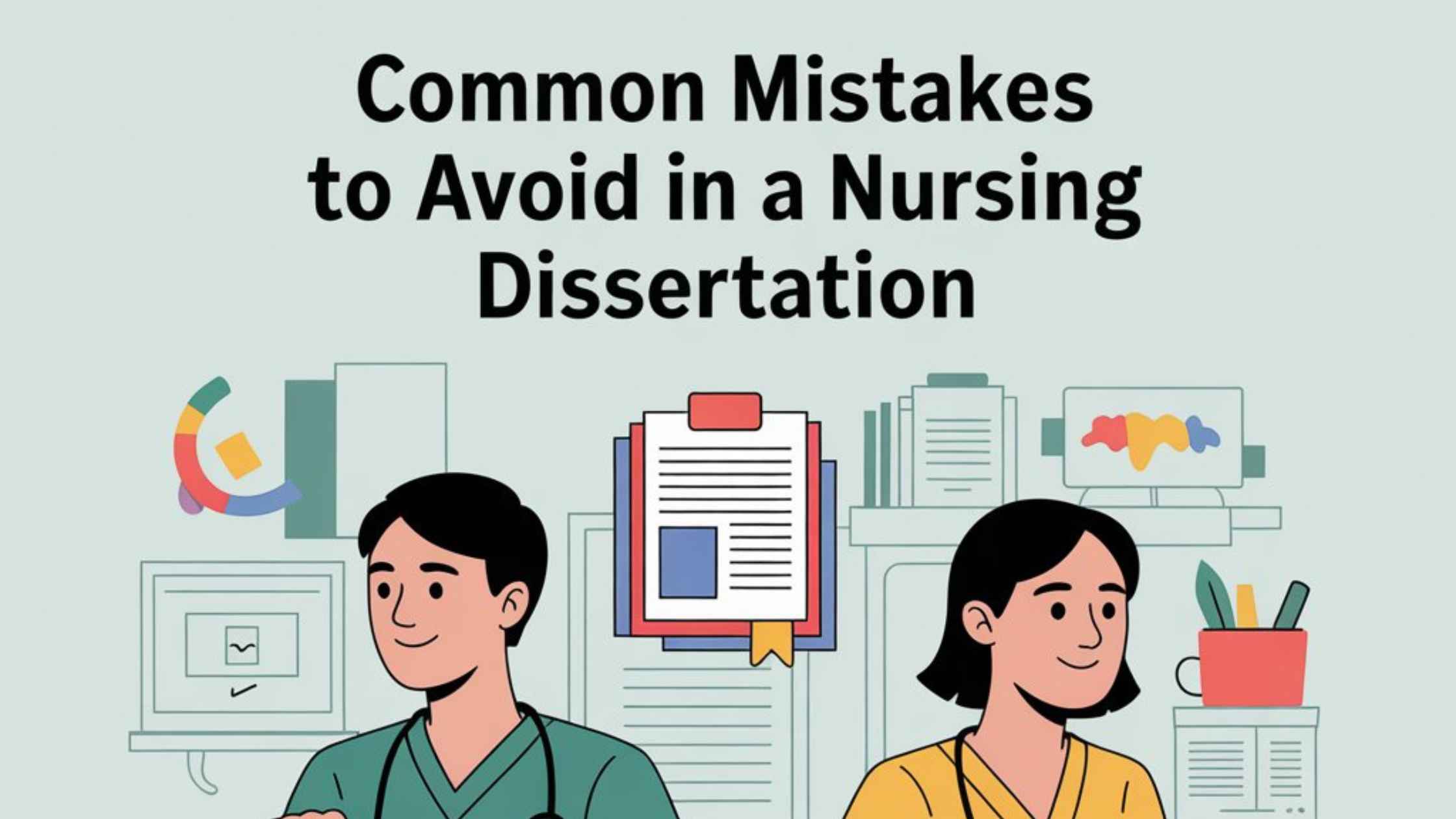In medical studies, a nursing dissertation plays a pivotal role; for that, it’s far beyond just an “extended” essay, meaning that it showcases your ability to do independent research, analyze critically, and apply various nursing principles and frameworks that you have learned over time while encountering real-world problems.
But many students fall into the trap that can undermine the quality and credibility of their work. From selecting poor topics to making blunders, common mistakes in nursing dissertation writing can eventually affect your final grade. In this compelling guide, we will be taking you on a tour of the most frequent nursing errors a student makes, and most importantly, how you can avoid them. So without any further delay, let’s jump straight into the topic!
Choosing the Wrong Topic
To begin with, one of the earliest and most critical mistakes a student can make is choosing a topic that is either too vast, too narrow, or something that lacks clinical significance. Some go for a popular or generic issue just to tick the box, without even noticing their relevant and genuine interest or the current relevance in the UK’s nursing practice.
A poorly selected topic can make the entire research process an exhausting process; not only have you selected the wrong topic, but you have wasted a lot of time, effort, and energy, which could’ve been utilized on something that could’ve been more rewarding and engaging. Thus, a loss of motivation, a loss of acknowledgment, and a loss of countless hours you spent.
Solution on the go
So now you must be thinking, well how do I deal with this? First, you need to select a topic that you are sure of, one that fits perfectly with your interests and with the NHS or global health trends, and for those who are still confused as to what they should select for their first topic, no need to panic. Our nursing dissertation writing help support is there always, to assist you, help you with the best solution that not only shapes your topic, but also complies with the UK’s healthcare standards.
Weak Literature Review
Another major commonality that lies in the literature is the review section. Students typically mistake this for a simple and basic summary of existing sources. Instead, a strong literature review needs more critical and in-depth engagement, so now is the perfect time to show that you understand what has been done in your selected area, where it falls apart, and how your research aligns
How To Deal With It?
A poor literature can be viewed as an unreal base that lacks integrity. Using outdated materials or even including obsolete sources of information can cause your dissertation to sound unrealistic or too outdated. For that, it’s our recommendation to prioritize the highest literature from authentic sources such as PubMed, NICE rules and regulations, and other medical journals. Organizing the literature thematically rather than listing one article helps to create a logical and structural flow.
For that, you should try hard and aim to know and identify debates, conflict findings, and gaps that your research aims to fill in. For example, if you are looking to conduct research in infection control protocols, demonstrate how current studies might lack insights into implementation challenges on understaffed wards in UK hospitals.
Poor Research Methodology
A nursing dissertation can be grounded when it comes to doing a strong research methodology, but the majority of the students make very negligible mistakes of going with an inappropriate method in order to justify their choice, or not explaining how their method is supposed to support their research question. Let’s say, using a quantitative approach for a study that specifically aims to explore emotional responses that might not be the correct fit.
What Impact Does It Have?
Invalid or vague descriptions of data collection tools, sample sizes, and analytical methods are an alarming red flag for invigilators. And if that’s not it, you also can’t deny the overlooked ethics, especially in the healthcare domain. Any study that involves patients’ relevant data or healthcare should be authorized by your university’s board, and where it feels necessary, NHS Research Ethics Committees are supposed to be consulted.
So if you are quite unsure of taking a qualitative or a quantitative route, speak to your supervisor at the earliest, a well-explained and justified methodology is not only made on trust but also protects your reader while strengthening the overall quality of your dissertation.
Neglecting the Nursing Process Framework
One thing that you should be very specific with is that nursing isn’t just about healthcare; it’s about the structure and evidence-based care delivery. A surpassing number of students usually overlook the value of incorporating the nursing process into their dissertation. A five-step approach (ADPIE): assessment, diagnosis, planning, implementation, and evaluation, is foundational in UK nursing education.
Consult Our Experts
Let’s say your university doesn’t make it mandatory, weaving the ADPIE structure into your clinical-oriented discussion can take the spark and make your analysis more coherent and practically more sound, and relevant. For much better clarity and a wider understanding of incorporating clinical analysis into your work, we recommend checking out the first-class nursing assignment in the UK, which aligns with the concepts beautifully discussed here.
Failing to Analyse and Interpret Data Effectively
Collection of data is one thing, but integrating and interpreting it contextually is where most of the dissertation comes short. Many students make the mistake of barely presenting numbers or quotations without reviewing or knowing what they mean about the research question. Not only does this weaken your argument, but it also leaves your dissertation in a cliché form, giving it a feeling of being unfinished.
Whereas in effective data analysis, it plays a pivotal role in looking for patterns, discussing anomalies, and even linking your findings back to the existing literature. So if your results don’t align with the hypothesis, that’s not a problem, as a matter of fact, it can lead to some very interesting discussions as long as you have explained it well. So if you are using SPSS for statistical data or thematic analysis for interviews, your interpretation must be solid, confined, and logical.
Formatting and Referencing Errors
Students usually take their time in making their dissertation aesthetically more appealing, but one thing they let their minds slip out is that no matter how good their content is, vague formatting and obsolete sources can hurt the credibility factor of their dissertation. Some of the very common and minor mistakes include inconsistent heading styles, page numbers that aren’t aligned, incorrect font usage, or even failure to include proper appendices. Since it’s a dissertation, poor referencing, wrong citations, incomplete references, or a bibliography that doesn’t tally in citations can lead to a loss of marks.
Nursing students in the UK are expected to adopt various styles such as APA, Harvard, or even OSCOLA, but again, that depends on your university’s authority. For more ease, we recommend using citation tools such as EndNote, Mendeley, or even Zotero to keep them authentic and relevant so that readers know that they are looking at something that’s genuine. And right when you are about to submit, take your time and cross-check thoroughly. Make sure everything is maintained as per the standards, such as spacing, font, references, linking, external links, and even headings.
Rushing the Process
Managing your time is one of the crucial aspect that plays a vital role in your dissertation’s success. Numerous students procrastinate project initiation or are overly optimistic on timing, which leads to hurried literature reviews, fostered ends of low-quality literature reviews, shallow analysis, low-quality projects with poor editing, and several other weaknesses ending in a low-quality final product. How to avoid that is make sure you give yourself enough time for each respective stage, research, write, revise, and even edit for each stage in order to ensure quality work. Make sure you provide time for unforeseen issues that may delay progress, technical challenges, difficulty in retrieving data, etc.
Not Tailoring Content to the UK Healthcare Context
For every different country, different healthcare and nursing policies are followed. One major mistake that is confused for another is writing a general dissertation, thinking that it’s widely applicable to the US, Australia, or even applicable to other countries. Citing the NHS, UK legislation, NICE guidelines, and relevant healthcare stats shows that your work is highly focused and grounded in the local context.
So, if you are putting your comparison to the international studies, make sure to state the references clearly or in contrast with the UK system. Remember, context is crucial, so if you are struggling to meet the UK’s academic criteria or need help in aligning your dissertation, make sure to explore our dissertation writing services that are made specifically for students studying in the UK.
Lack of Reflection in the Conclusion
At this stage, a good conclusion is no longer just a summary of the approach taken, nor is it a summary of the major findings and limits, but also something that might contain ideas for further research to defend its placement in this bottleneck. Many of the students simply rephrase earlier covered sections without offering any new relevant insights. This eventually leads to a missing opportunity to demonstrate critical thinking and academic nourishment. Use your conclusion to tie everything together. Show how your research contributes to the field, and suggest realistic recommendations for practice, policy, or further investigation.
Ethical Approval in Nursing Research
One of the most overlooked yet the most crucial areas in a nursing dissertation is the ethical approval that needs to be done by any how. Most of the students make an assumption that ethics is just another fancy name for formalities, which often leads to incomplete or rushed submissions that are often denied. But in reality, securing a legal clearance, especially when working with NHS patients, healthcare staff, or with sensitive data, it is crucial to uphold and research with integrity.
Right before the start of data collection, you need to ensure that you have gathered necessary permissions from your university’s panel/ For studies that involve NHS citations, you will need approval from the Health Research Authority (HRA). This includes a clear explanation of how participant consent will be obtained, how anonymity will be assured, and what preventive measures you will take to manage your sensitive data.
What to Include in Your Ethics Section:
- Consent procedures and forms
- Data protection methods (GDPR compliance)
- Justification for participant selection
- Risk assessments and mitigation strategies
The Role of Practice-Based Evidence in Nursing Dissertations
While the academic theory is the base, many of the medical students undermine the value of practice-based evidence. Specifically in the UK, where the NHS has a strong focus on practice, drawing from your clinical placements or recent shift in policy can make your dissertation heavier and impactful. Let’s say, if you’re exploring infection control, linking your real-world observations, which are supported by academic sources, adds more major impact. Demonstrating the gap between theoretical and real-world practices shows that your research holds much more authenticity than the real-world statistics.
Our Verdict
So you have avoided these pitfalls; the important thing is to create a quality dissertation that captures your potential as a nurse and a scholar. Storm the topic selection to the final formatting decision; every step is critical to your academic outcome. Awareness of common errors in your nursing dissertation writing can reduce avoidable stress and possible disorganization with a simplified dissertation on your topic throughout your research. But it’s fine if you are struggling; you can always reach out for academic support instead of writing a disorganized dissertation.
FAQs
What are the consequences if I fail my nursing dissertation?
If you failed for somewhat reason, there are chances to recover, which include retake options and even to appeal if you think the grading was unfair.
How do I select a topic for a nursing dissertation?
The topic that you will be selecting must be supported by the recent literature, filling the gap, and aligning with interest, making measurable outcomes more preferred.
How long is a nursing dissertation?
Usually, a nursing dissertation’s word count depends on the topic, but a standard word count is about 10,000 words.
What is the most challenging topic in nursing?
Pharmacology is considered to be one of the toughest topics.
What is the best research title for nursing?
- Pain management
- Patient’s safety
- Leadership and management in nursing
- Chronic management
- Evidence-based practice
- Nursing training programs
- Healthcare concerns and legal issues.



